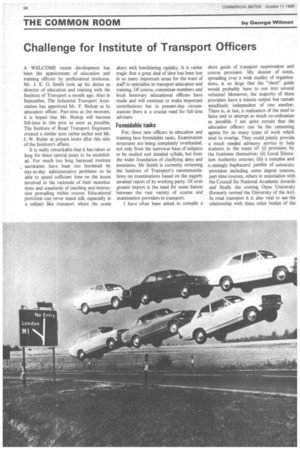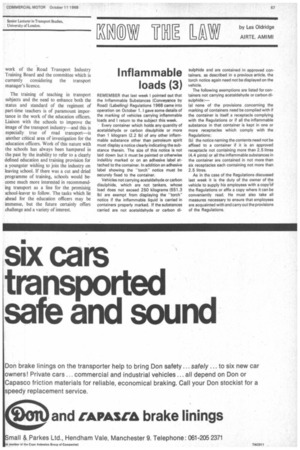Challenge for Institute of Transport Officers
Page 68

Page 69

If you've noticed an error in this article please click here to report it so we can fix it.
A WELCOME recent development has been the appointment of education and training officers by professional institutes. Mr. J. E. G. Smith took up his duties as director of education and training with the Institute of Transport a month ago. Also in September, The Industrial Transport Association has appointed Mr. F. Bishop as its education officer. Part-time at the moment, it is hoped that Mr. Bishop will become full-time in this post as soon as possible, The Institute of Road Transport Engineers created a similar post rather earlier and Mr. J. W. Butler at present looks after this side of the Institute's affairs.
It is really remarkable that it has taken so long for these special posts to be established. For much too long harassed institute secretaries have been too burdened by day-to-day administrative problems to be able to spend sufficient time on the issues involved in the rationale of their examinations and standards of teaching and instruction prevailing within course. Educational provision can never stand still, especially in a subject like transport where the scene alters with bewildering rapidity. It is rather tragic that a great deal of time has been lost in so many important areas for the want of staff to specialize in transport education and training. Of course, committee members and local honorary educational officers have made and will continue to make important contributions but in present-day circumstances there is a crucial need for full-time advisers.
Fomidable tasks For, these new officers in education and training face formidable tasks. Examination structures are being completely overhauled, not only from the narrower base of subjects to be studied and detailed syllabi, but from the wider foundation of clarifying aims and intentions. Mr Smith is currently reviewing the Institute of Transport's recommendsfions on examinations based on the eagerly awaited report of its working party. Of even greater import is the need for some liaison between the vast variety of course and examination providers in transport.
I have often been asked to compile a short guide of transport examination and course provision. My dossier of notes, spreading over, a wide medley of organizations, is so large that the "short" guide would probably have to run into several volumes! Moreover, the majority of these providers have a minute output but remain steadfastly independent of one another. There is, at last, a realization of the need to liaise and to attempt as much co-ordination as possible. I am quite certain that the education officers can be the cementing agents for so many types of work which tend to overlap. They could jointly provide a much needed advisory service to help students in the maze of: (i) provision by the Institutes themselves; (ii) Local Education Authority courses; (iii) a complex and seemingly haphazard jumble of university provision including some degree courses, part-time courses, others in association with the Council for National Academic Awards and finally the coming Open University (formerly termed the University of the Air). In road transport it is also vital to see the relationship with these other bodies of the work of the Road Transport Industry Training Board and the committee which is currently considering the transport manager's licence.
The training of teaching in transport subjects and the need to enhance both the status and standard of the regiment of part-time teachers is of paramount importance in the work of the education officers. Liaison with the schools to improve the image of the transport industry—and this is especially true of road transport—is another critical area of investigation for the education officers. Work of this nature with the schools has always been hampered in the past by the inability to refer to a clearly defined education and training provision for a youngster wishing to join the industry .on leaving school. If there was a cut and dried programme of training, schools would become much more interested in recommending transport as a line for the promising school-leaver to follow. The tasks which lie ahead for the education officers may be immense, but the future certainly offers challenge and a variety of interest.












































































































